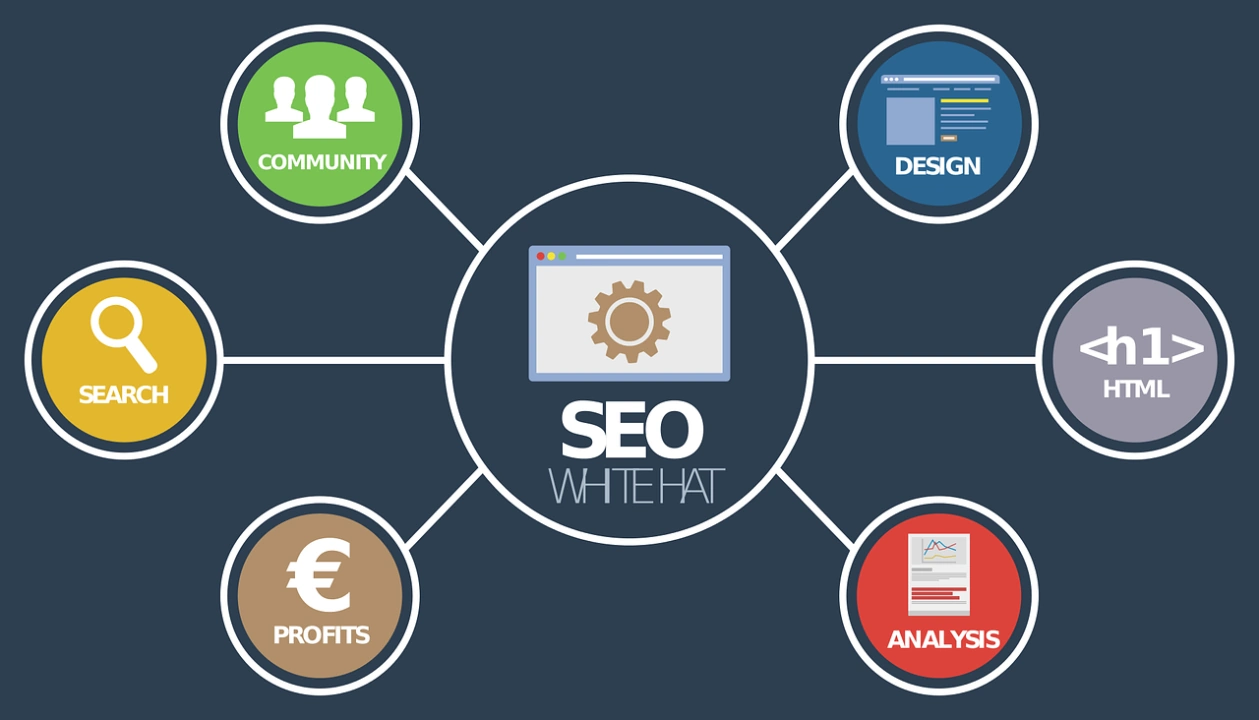SEO FOR LOCAL BUSINESSES
Get your business recognized with Local SEO
What is Local SEO?
Local SEO (Search Engine Optimization) helps a small business get visibility on search engines for local searches related to their products and services. On Google’s search engine result pages, local SEO is most recognized through Google Maps, Google Local, and traditional Google Search results.
Google says that local SEO rankings are determined by Relevance, Distance, and Prominence. Some important factors that help define what Local SEO is include:
Relevance
Business Listings
Business profiles should be created on these sites to establish local citations.
Google My Business
Bing Places
Yelp
Social Media profiles like Facebook
Yellow Pages
Other Business Directories
On Page SEO
Information on your website is used to determine whether your small business would match the intent of a local search. Here’s a few elements of on page SEO that is factored into local rankings:
Keyword Research
Page Title Tags & Meta Descriptions on Webpages
Mobile Friendly (for Mobile Searches)
Schema Markup
Local Keywords on Landing Pages & Service Pages
Social Media Profiles
Phone Number
Distance
Distance is self-explanatory: is the physical location of your small business within the service area in which a search is being conducted.
Managed Local Citation Services
These services identify and correct inaccuracies like business name, address, phone number (NAP), and other information pulled into local search results.
Moz
Yahoo Local
Whitespark
Prominence
Prominence is an umbrella term that captures how important your business is, based on brand, customer experience, and more factors that include:
Online Reviews
Yelp Reviews
Google Reviews
Other Positive Reviews & Testimonials
Off Page SEO
Backlinks (Especially Local Links)
Brand Mentions (how often is your business name searched)
Content Marketing (Articles written by bloggers)
Search Engine Results
Business SEO best practices apply to local efforts too
So, what is Local SEO? It’s a combination of Relevance, Distance, and Prominence, all put together to display the most relevant local search results for potential customers.
Why is Local SEO important?
According to Google, every month there are:
5 billion searches on Google for restaurants
3 billion searches for hotels
1 billion searches for clothing stores
600 million searches for hair and beauty salons
5 million searches for coffee shops
Local SEO helps market your small business to potential customers at the exact moment when they are seeking products and services similar to yours.
For example, say you’re in the mood for Chinese food and you conduct a search for Chinese restaurants. In that moment, a searcher is highly likely to visit a Chinese food restaurant – much more likely than if they just received a piece of direct mail, or saw a social media ad that advertised a local Chinese restaurant.
Searcher intent is captured within local SEO through relevance (Chinese food versus Italian food), distance (0.3 miles away versus 30 miles away), and prominence (is this good Chinese food, based on reviews from Yelp, Tripadvisor, and other ranking factors?).
For those reasons, Local SEO is a key component of a marketing strategy for a local business. Even if you aren’t a brick and mortar business, Search Engine Optimization has shifted in recent years towards a local search focus.
Take our small business for example. A few years ago, our website began to rank on the first page of search results nationwide for the term “digital marketing company.” Today, while we still enjoy a prominent ranking for this term, search engine result pages now show business listings in Google maps, local listings of nearby small businesses, as well as organic listings like ours.
In other words, the space has gotten more competitive and crowded as Google has identified keywords that would better match searcher intent with local search results.
With that said, using Local SEO to reach potential customers in your service area is an important online marketing tactic for almost any small business.
How do I improve Local SEO?
Local citations, local links, positive reviews, and consistent business profiles are all important factors to improve Local SEO efforts.
However, there are ten simple things you can do to improve Local SEO.
- Set up your Google My Business page. Not only will you get a free business listing that can appear in search results, but you’ll also be able to connect with customers through Google Search and Maps.
- Optimize page title tags and meta descriptions. Audit your landing pages and update the meta information search engines rely on with local keyword data.
- Generate positive reviews. Ask your past, present, and future customers to share their experiences on Google and Yelp.
- Fix inconsistent information. Businesses sometimes change physical locations, phone numbers, and even business names. Ensure your name, address, and phone numbers (NAP) listings are consistent across all business directories.
- Create content. Conduct keyword research and identify content local customers are searching for. This can include points of interest nearby your physical location, or relevant events that indicate to search engines that your site shares information about local happenings.
- Mobile friendly. Make sure your website is optimized for mobile searches, as the majority of local searches are done on mobile phones and via voice search.
- Create business profiles. There are hundreds of business directories that give small businesses the opportunity to share information about their business with local customers. Make sure to have a presence on the major directories (Yelp, Bing, and Facebook) as well as niche directories (Foursquare, Factual, Infogroup, Apple Maps).
- Search engine snippets. Utilize Technical SEO to optimize the display of your business on SERPs.
- Local Placements. SEO experts refer to this as localized link building, but in actuality, it’s promoting your business to local journalists and local organizations who would be interested in covering your news. Local links from relevant sources can help boost ranking on the local level.
- Conduct an audit. Start by doing a free online presence check using a tool like Moz, Yahoo, or Whitespark.
Try all of these things, and that should be enough to get started on the road to improvement.
What are Local SEO Citations?
A local citation is a mention of a business online. This can include the mention of a business name, address, phone number (NAP) on any directory, website, article, app, or social platform.
These local citations help prospective customers discover relevant businesses, and can also influence local search rankings.
Data within a local citation can include:
Business name
Address
Phone Number
Business Category
Hours of Operation
Website URL
Social Media Links
Photos
Verified Listings
Reviews
Owner Response to Reviews
Email Addresses
And more!
The best way for a small business to manage local citations is to verify the accuracy of the information, and to fill out complete profiles on the business directories that matter.
Why are local citations important? Because they can mislead potential customers. The wrong address, phone number, or hours of operation can negatively impact a customer experience. And since search engines focus intensely on user experience, a misleading local citation can lead to a decrease in visibility on search rankings.
That’s why local citations are so important to Local SEO. Local searchers rely on them for information about your business; and so do search engines.
How to improve local SEO rankings on Google?
Google provides business owners with a business listing that appears in both Google Maps and local search results.
Here’s how to maximize your business page in a Google Search:
- Enter complete and accurate information
The more information about your business, the easier it is for a local search engine to connect local customers with your goods and services. Make sure to fill out information like your physical location, phone number, webpage, and other business information.
Learn how to edit your business information.
- Verify your locations
To appear in SERPs like Google Maps and Google Search, business locations must be verified by adding or claiming your business listing. This can be done through a Google My Business listing.
- List accurate hours
Potential customers need to know when your business will be open. Adding store or office hours gives both customers and Google confidence to rely on the information in search engine results.
- Manage & Encourage Google Reviews
Monitoring and responding to online reviews shows potential customers that you care about their business. Positive reviews give searchers an idea of what to expect if they were to call the listed phone number to learn more.
- Add photos
Images have always been an important part of search engine optimization. Including photos of your office, products, and services not only improves your local listing but it’s an important factor to differentiating your business in results pages.
There are several other ranking factors that enable a small business to appear in a local pack on desktop and mobile searches. But, these are some of the main tips offered by Google Local Guides.
How does Google determine local search rankings?
Google shares that local ranking is primarily determined by relevance, distance, and prominence.
Relevance
Google receives a local search query and connects a user with a few local business listings. These local listings are based on Google’s understanding your business. The more information you share with Google about your business – business name, phone number, website – the better Google can match your business to a relevant potential customer.
Distance
There’s not much magic to distance. How far is the search away from your local business? The closer the search, the more likely your business will display in the local pack of search engine result pages.
Prominence
Prominence, according to Google, is how well-known a business is. Local links, articles from bloggers, local citations, and more digital marketing tactics all factor into the umbrella term of “prominence.” Other important factors include positive reviews, local keywords, and even schema markup. Basically, anything online marketing related that falls outside of “Relevance” and “Distance.”
You can learn more about how Google determines local ranking here.
You can learn more about how Google determines local ranking here.
How much does Local SEO cost?
The cost of Local SEO ranges between $250 to $2,500 per month, depending on your location, industry, and business. Another factor in cost is whether you do it yourself or pay a local SEO agency.
Some do-it-yourself tools like Yoast Local SEO ($69 / year) or Moz Local ($129 / year) are very affordable for a small business.
SEO companies who offer Local SEO services can charge between $250 – $2,500 / month. These packages can include a combination of content marketing, schema markup, and link building.
The best way to get accurate pricing information is to request a proposal. To find out how much local SEO will cost your company, chat with us, contact us, or call us to learn more.

